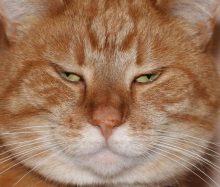Obesity is a serious and, unfortunately, very common health issue in cats today. I am ashamed to admit I am guilty of allowing one of my cats to become obese. Ellie was starving when we found her. She had been abandoned as a young cat, and she was apparently not a natural hunter. Once we adopted her, I never wanted her to be hungry again, and I guess I let it get out of control. The next thing I knew, we had a terribly overweight cat.
Taking that weight off can be difficult. It’s very important for your cat’s health that the weight loss occurs very gradually. Rapid weight loss in cats can result in serious health issues. In Ellie’s case, her weight loss occurred very slowly, but steadily, over the course of several months.
- Feed a good quality canned cat food instead of dry kibble. It’s higher in protein and moisture and lower in carbohydrates.
- Ideally, cats enjoy several small meals throughout the day. You can serve small meals before work, after work, and later in the evening. (Rewarm leftover cat food that’s been refrigerated before serving.) Avoid “free-feeding” or leaving an unlimited supply of food out on which your cat can gorge.
- Optionally, when you serve the canned food, use a bit less than a normal portion, and mix in a small amount of water to the serving. It will add volume, make your cat feel fuller, and the extra water consumption is an added benefit. Be careful not to add too much, or it will be too diluted and your cat won’t eat it. Just a teaspoon or so should be fine.
- Weigh your cat regularly, every day or two if possible, and keep a record so that you can track your cat’s progress. I used a baby scale for this purpose, and it worked out great.
For more information about obesity in cats, the experts at Cornell Feline Health Center discuss feline obesity in this post.
